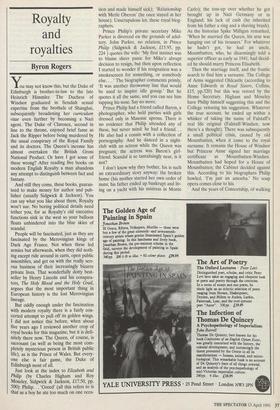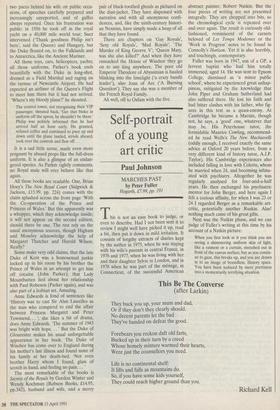Royalty and royalties
Byron Rogers
You may not know this, but the Duke of Edinburgh is brother-in-law to the late Heinrich Himmler. The Duchess of Windsor graduated in fiendish sexual expertise from the brothels of Shanghai, subsequently broadening her curriculum vitae even further by becoming a Nazi agent. The Duke of Clarence, second in line to the throne, enjoyed brief fame as Jack the Ripper before being murdered by the usual conspiracy of the Royal Family and its doctors. The Queen's income has almost overtaken the British Gross National Product. Or have I got some of these wrong? After reading five books on modern English Royalty a man abandons any attempt to distinguish between fact and fantasy.
And still they come, these books, guaran- teed to make money for author and pub- lisher (usually Sidgwick & Jackson). You can say what you like about them, Royalty won't sue. No boring political details need tether you, for as Royalty's old executive functions sink in the west so your balloon floats unhindered into the blue skies of scandal.
People will be fascinated, just as they are fascinated by the Merovingian kings of Dark Age France. Not when these led armies but afterwards, when they did noth- ing except ride around in carts, open public assemblies, and get on with the really seri- ous business of their increasingly bizarre private lives. That wonderfully dotty best- seller by Henry Lincoln and his conspira- tors, The Holy Blood and the Holy Grail, argues that the most important thing in European history is the lost Merovingian lineage.
But oddly enough under the fascination with modern royalty there is a fairly con- certed attempt to pull off its golden wings. I did not notice this before, when about five years ago I reviewed another crop of royal books for this magazine, but it is defi- nitely there now. The Queen, of course, is sacrosant (as well as being the most com- pletely mysterious person in British public life), as is the Prince of Wales. But every- one else is fair game, the Duke of Edinburgh most of all.
Just look at the index to Elizabeth and Philip (by Charles Higham and Roy Moseley, Sidgwick & Jackson, £17.50, pp. 500): Philip. . . 'Greed' (all this refers to is that as a boy he ate too much on one occa- sion and made himself sick); 'Relationship with Merle Oberon' (he once stayed at her house). Unscrupulous lot, these royal biog- raphers.
Prince Philip's private secretary Mike Parker is divorced on the grounds of adul- tery. John Parker, no relation, in Prince Philip (Sidgwick & Jackson, £15.95, pp. 224) quotes the wife: 'My first instinct was to blame sheer panic for Mike's abrupt decision to resign, but then upon reflection I started to wonder if his resignation was a smokescreen for something, or somebody else. . . ' The biographer comments primly, `It was another throwaway line that would be used to inspire idle gossip.' But he quotes it all the same, and you can see him tapping his nose. Say no more.
Prince Philip had a friend called Baron, a photographer, who held parties with girls dressed only in Masonic aprons. There is no evidence that Philip attended any of these, but never mind: he had a friend.. . He also had a cousin with a collection of pornography. And he danced in a night- club with an actress while the Queen was pregnant; the actress was Baron's girl- friend. Scandal is so tantalisingly near, is it not?
I don't know why they bother, his is such an extraordinary story anyway: the broken home (his mother started her own order of nuns; his father ended up bankrupt and liv- ing on a yacht with his mistress in Monte Carlo); the toss-up over whether he got brought up in Nazi Germany or in England; his lack of cash (he inherited from his father a ring and a shaving brush). As the historian Spike Milligan remarked, `When he married the Queen, his arse was hanging out of his trousers.' For whatever he hadn't got, he had an uncle, Mountbatten, who, he disarmingly told a superior officer as early as 1941, had decid- ed he should marry Princess Elisabeth.
Then the marriage itself, and the frantic search to find him a surname. The College of Arms suggested Oldcastle (according to Anne Edwards in Royal Sisters, Collins, £15, pp.320) but this was vetoed by the Home Secretary. Higham and Moseley have Philip himself suggesting this and the College vetoeing his suggestion. Whatever the true account, he ended up within a whisker of taking the name of Falstaff's real life original (Falstaff-Windsor, now there's a thought). There was subsequently a small political crisis, caused by old Mountbatten, when it came to the royal surname. It remains the House of Windsor but Princess Anne signed her marriage certificate as Mountbatten-Windsor. Mountbatten had hoped for a House of Mountbatten; the Cabinet decided against this. According to his biographers Philip howled, 'I'm just an amoeba.' No soap opera comes close to his.
And the years of Consortship, of walking two paces behind his wife on public occa- sions, of speeches carefully prepared and increasingly unreported, and of gaffes always reported. Once his frustration was public: in 1956 he took off in the royal yacht on a 40,000 mile world tour; Suez intervened (`Thank goodness Philip isn't here', said the Queen) and Hungary, but the Duke floated on, to the Falklands and to Antarctica, like the Ancient Mariner.
All those toys, cars, helicopters, yachts; all those uniforms. Parker's book ends beautifully with the Duke in long-shot, dressed as a Field Marshal and raging on the tarmac of Newcastle Airport. He had expected an airliner of the Queen's Flight to meet him there but it had not arrived. `Where's my bloody plane?' he shouted.
The control tower, not recognising their VIP passenger, shouted back, 'Get that bloke in uniform off the apron, he shouldn't be there.' Philip was politely informed that he had arrived half an hour early. He grunted, refused coffee and continued to pace up and down until the plane landed, strode aboard, took over the controls and flew off.. .
It is a sad little scene, made even more poignant by absurd props like the full-dress uniform. It is also a glimpse of an endan- gered species. As Parker rightly comments, no Royal male will ever behave like that again.
All these books are readable. One, Brian Hoey's The New Royal Court (Sidgwick & Jackson, £15.99, pp. 224) comes with the claim splashed across the front page 'With the Co-operation of the Prince and Princess of Wales.' But this apparently was a whopper, which they acknowledge inside; it will not appear on the second edition, should there be one. The rest rely on the usual anonymous sources, though Higham and Moseley acknowledge the help of Margaret Thatcher and Harold Wilson. Really?
Some make very odd claims, that the late Duke of Kent was a homosexual junkie locked up in his room by his brother the Prince of Wales in an attempt to get him off cocaine (John Parker); that Lady Mountbatten lied about her relationship with Paul Robeson (Parker again), and was also part of a lesbian set. Amazing.
Anne Edwards is fond of sentences like `History was to cast Sir Alan Lascelles as the man who conspired to end the affair between Princess Margaret and Peter Townsend. . . '; she likes a bit of drama, does Anne Edwards. The summer of 1943 was bright with hope. . . ' But the Duke of Gloucester makes his usual unforgettable appearance in her book. The Duke of Windsor has come over to England during his mother's last illness and found none of his family at her death-bed. 'Not even brother Harry whom I found, glass of scotch in hand, and feeling no pain. . . '
The most remarkable of the books is Secrets of the Royals by Gordon Winter and Wendy Kochman (Robson Books, £14.95, pp.342), husband and wife, and a merry
pair of black-toothed ghouls as pictured on the dust-jacket. They have dispensed with narrative and with all anonymous confi- dences, and, like the ninth-century histori- an Nennius, have simply made a heap of all that they have found.
There are chapters on 'Gay Royals', `Sexy old Royals', 'Mad Royals'; 'The Murder of King Georve V'; 'Queen Mary, was she also killed?' And when they have ransacked the House of Windsor they go on to any king anywhere. The poor old Emperor Theodore of Abyssinian is hauled blinking into the limelight Ca crazy bandit leader'), also Joan of Arc CA Burning Question'). They say she was a member of the French Royal Family.
Ah well, off to Oxfam with the five.



























































 Previous page
Previous page